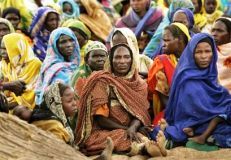Janjaweed obscures tribal conflict in Darfur
By Opheera McDoom
SULEIAH, Sudan, Sept 27 (Reuters) – Halima Abdallah Hassan was awakened in the dead of the night when bandits began shooting into her home in the remote Darfur region of Sudan.
 Two members of her family were killed and three others were injured.
Two members of her family were killed and three others were injured.
Hassan said she could not see her attackers because she hid under the bed as soon as she heard gunfire.
“But it was of course the Janjaweed — only the Arabs would kill us,” she said.
Hassan’s cousin, Yehya Abakr Ali, was one of the three injured family members who walked four hours to the nearest hospital in Suleiah town in West Darfur state, about 60 km (37 miles) from the border with Chad.
He lay in a dark bare cell in the hospital, with gunshot wounds to his right leg and arm, which has wasted away in the days since Thursday’s attack.
“That afternoon they took 35 of my cows,” said Ali, who had lost all his cattle the previous year before he fled to Chad but said he stole some back on his return.
Like Hassan he said he could not see his attackers’ faces but he was certain of their identities.
“It was the Arabs, the Janjaweed,” he said, also accusing a mixed Arab-African tribe from the north of Darfur.
Jo Mason, of the Irish non-governmental organisation Concern, said the term Janjaweed has become ubiquitous.
While it was once applied to mounted Arab militia who rebels say were employed by the government to put down their rebellion, any thief with a gun in some parts of Darfur is now a “devil on horseback”.
“The problem is Janjaweed has become a generalised term they use for everything. They know we recognise it,” she said.
After years of low-level tribal conflict between Arab nomads and mostly non-Arab farmers, rebels took up arms last year accusing Khartoum of neglect and of supporting marauding Arab militias to loot and burn non-Arabs villages and drive them off their land.
The fighting has displaced about 1.5 million people, with 200,000 of the refugees in Chad, triggering what the U.N. calls one of the world’s worst humanitarian crises and the United States calls genocide.
The government admits arming some militias to fight the rebels, but denies any links to the Janjaweed, calling them outlaws.
Mason said she heard many of the raids in the area where the Hassan family lived were by the African Zaghawa tribe, who often crossed the border from Chad to steal cattle.
“This is traditional tribal conflict here,” Mason said. “There have been historical differences between the different African tribes here,” she added.
The rebel Sudan Liberation Army (SLA) is mostly made up of the Zaghawa tribe, one of the tribes worst-affected by the violence.
While many refugees in camps within Darfur accuse the government of direct involvement in attacking their villages, Bishara Ahmed Teyab, said it was only Janjaweed who burnt his village.
“The government used to come after the attacks and prevent us from attacking the Janjaweed,” he said. He added the government would try to disarm them, and accused them of being part of the rebel movements.
“But we are not with the opposition,” he said, also denying there were any rebel forces in the area.
